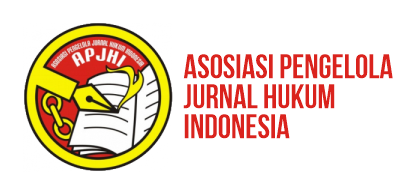International Legal Regulations Concerning Launching of Russian Anti-Satellite Weapon Missiles Reviewed in Space Law Perspective
Abstract
The development of weapons technology is currently very advanced and competitive, one of which is the Anti-Satellite weapon (ASAT) technology. ASAT has become a real threat to the sustainability of the space environment, this is because ASAT has the potential to damage international peace and security, trigger an arms race, and increase the amount of space debris orbiting the earth. The absence of regulations that specifically regulate ASAT makes countries feel free to conduct anti-satellite missile test launches. For example, in 2021 Russia conducted an ASAT test targeting the Cosmos-1408 satellite. Using normative juridical research and research approaches with statute approach, case approach, and analytical approach, the author wants to study and analyze international legal arrangements regarding the launch of Anti-Satellite Weapon (ASAT) missiles and the legal consequences against Russia as the country that launches Anti-Satellite Weapon (ASAT) missiles. Based on the results of the study, the researchers found that there were no regulations specifically limiting ASAT, but the regulation in question should have been contained in the Outer Space Treaty 1967 as the basis for regulating all activities related to space, then further legal consequences against Russia for launching anti-missile missiles. -satellite, namely Russia is obliged to be responsible in terms of responsibility and liability in terms of liability and is strengthened by the principle of liability based on fault as stated in the Liability Convention 1972.
Keywords
Full Text:
PDFReferences
References
Books:
Haryomataram, Introduction to Humanitarian Law, PT Rajagrafindo Persada, Jakarta, 2005, page 217.
Huala Adolf, Aspects of the State in International Law, Rajawali Pers, Jakarta, 1991, p. 173.
IDG Palguna, International Space Law (Outer Space Law): Study of Utilization for Peaceful Purposes, (Depok: Rajagrafindo Persada, 2019) pp. 12-13.
Ishaq, Fundamentals of Law, Cet. I, Sinar Graphic, Jakarta, 2001, p. 45.
Nugraha Pranadita, et al. Space Law Theory, (Yogyakarta: Deepublish, 2019) p 1.
Peter Mahmud Marzuki, Legal Research, (Jakarta: Kencana Prenada Media Group, 2005). p. 133.
Shawn N. Malcolm, International Law, Nusa Media, Bandung, 2013, p. 774.
Soedjono Soekanto and Sri Mamudji, Normative Legal Research: A Brief Overview, (Jakarta: Rajawali Press, 2006), p. 23.
T. May Rudy, 2002, International Law 2, (Bandung: PT Refika Aditama, 2002), p. 39.
Journal articles:
David Wright, 2008, China's Kinetic Energy Anti-Satellite Test. Harvard Asia Review
Julio Barboza, The Environment, Risk, and Liability in International Law, Martinus Nijhoff Publisher, Leiden Boston, (2011).
Ahmad Wijaya and Nasran, "Comparison of Judicial Review: A Critical Approach to the Model in Several Countries", Journal of Legality, Vol. 14 No. 2, (2021).
Lucy Stojak, The Non-Weaponization of Outer Space, Prepares for the International Security Research and Outhreach Programme, International Security Bureau, (2002).
Marthinus Omba, "The Principles of Freedom in Space According to the 1967 Outer Space Treaty and Its Development", Journal of Law & Development, Vol. 24 No. 04, (1994).
Melisa Towadi, Etc. "An Indication of China's Policy Towards Uighurs and its Implications by International Law Aspects", Jambura Law Review, Vol. 3 No. 1, (2021).
Moh Rusdiyanto U. Puluhulawa and Riski Husain, "Body Shaming Through Social Media As a Digital Crime in the Era of Disruption", Jambura Law Review, Vol. 3 No. 1, (2021).
Novendri M. Nggilu, Lisnawaty W. Badu, and Suwitno Y. Imran, "Legal Protection Bonda and Bulango Language: in Reality and Prospect", Jambura Law Review, Vol. 3 No. 1. (2021).
Nur Mohamad Kasim and Indra Saputra Daud, "Application of the Concept of Maslahah by Judges to Issuance of Marriage Dispensation Due to Pregnancy in eligious Courts, Jambura Law Review, Vol 4 No. 1, (2022).
Nuvazria Achir, "Fulfillment of the Constitutional Right of Abandoned Children Victims of Economic Exploitation", Jambura Law Review, Vol. 4 No. 1, (2022).
Internet:
http://www.amazine.co/14488/berapa-nomor-satellite-yang-orbit-earth/ (accessed on February 17, 2022 at 02:00 WITA)
https://www.firstpost.com/world/russia-earns-global-ire-over-anti-satellite-missile-test-how-these-tests-create-problem-of-space-junk-10140511.html ( accessed on 17 February 2022 at 04:14 WITA)
ойгу аÑвил, о оенные а аниÑÑ… "ювелирно" оразили арый, https://www.interfax.ru/russia/803315 (accessed February 17, 2022 at 23:45 WITA).
https://carnegieendowment.org/2021/11/17/dangerous-fallout-of-russia-s-anti-satellite-missile-test-pub-85804 (accessed February 17, 2022 at 00:27 WITA).
Publication:
Selvie Ruthyarodh, Regulation of Commercialization of Space in International Law (Thesis), Faculty of Law, University of North Sumatra, Medan, 2001, p. 1-2.
DOI: https://doi.org/10.33756/eslaj.v4i2.15943
Refbacks
- There are currently no refbacks.
Copyright (c) 2022 Moh. Rifki Daud
License URL: http://creativecommons.org/licenses/by-sa/4.0/
| | | |
| | | | |
| | | | |
| | |
Estudiante Law Journal has been available at:
| | | | |
| | | | |
| | | | |
| | | | |




-2.png)
.png)





